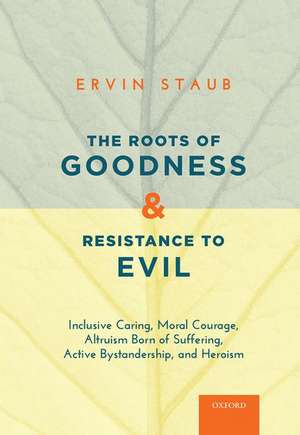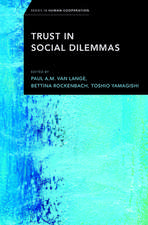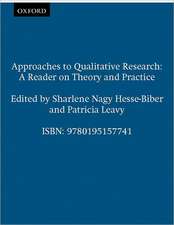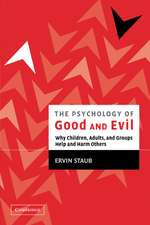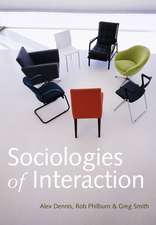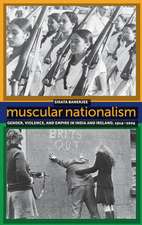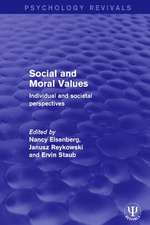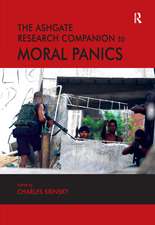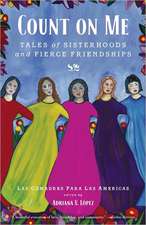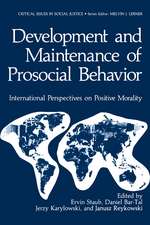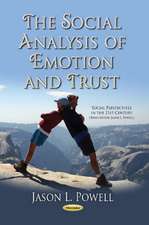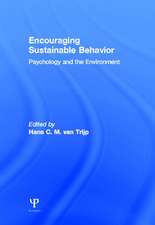The Roots of Goodness and Resistance to Evil: Inclusive Caring, Moral Courage, Altruism Born of Suffering, Active Bystandership, and Heroism
Autor Ervin Stauben Limba Engleză Paperback – 14 apr 2016
| Toate formatele și edițiile | Preț | Express |
|---|---|---|
| Paperback (1) | 457.20 lei 22-36 zile | |
| Oxford University Press – 14 apr 2016 | 457.20 lei 22-36 zile | |
| Hardback (1) | 498.92 lei 31-37 zile | |
| Oxford University Press – 16 apr 2015 | 498.92 lei 31-37 zile |
Preț: 457.20 lei
Nou
Puncte Express: 686
Preț estimativ în valută:
87.49€ • 91.57$ • 72.82£
87.49€ • 91.57$ • 72.82£
Carte disponibilă
Livrare economică 10-24 martie
Preluare comenzi: 021 569.72.76
Specificații
ISBN-13: 9780190607982
ISBN-10: 019060798X
Pagini: 410
Dimensiuni: 251 x 175 x 20 mm
Greutate: 0.74 kg
Editura: Oxford University Press
Colecția OUP USA
Locul publicării:New York, United States
ISBN-10: 019060798X
Pagini: 410
Dimensiuni: 251 x 175 x 20 mm
Greutate: 0.74 kg
Editura: Oxford University Press
Colecția OUP USA
Locul publicării:New York, United States
Recenzii
In The Roots of Goodness and Resistance to Evil, Ervin Staub helps us understand how each of us can tap into our own compassion and moral courage. Drawing on many years of comprehensive research and work in real-world settings, and inspired by his own experience as a childhood survivor of the Holocaust, Staub has written a book with the unique power to illuminate the best of humanity in individuals and societies.
In this excellent book, Ervin Staub writes from a lifetime of knowledge and experience, both personal and professional. He has never been a bystander. You will cherish his insight, and perhaps even more the goodness of his heart.
This book is especially recommended to those who want to deal intensively with the treatment of suffering in the whole society.
This book is a compilation of the insights of a devoted scholar who has studied good and evil for approximately 45 years. Staub deals with some of the most important issues of our time: violence against outgroup members; altruism, moral courage, and reconciliation; and how and why a person is a perpetrator versus a helper. This book is an important resource for anyone interested in fostering compassion, helping behavior, and caring societies.
Dr. Ervin Staub has delivered another gift of a book, this one on human goodness and the capacity to resist evil. A highly humanistic and hopeful book, it offers a counterbalance to human suffering and shows the capacity for caring and sustenance in the face of all forms of victimization. Dr. Staub has lived this experience personally as a child rescued from the Holocaust and as an adult in his research and field work around the globe. Highly recommended reading for professional and lay audiences alike.
Ervin Staub combines his own remarkable life experience with the highest academic standards in diagnosing the root causes of evil, and reverse engineering that analysis to reveal the conditions that allow the flourishing of a compassionate and harmonious society. The Roots of Goodness and Resistance to Evil should be required reading in the social sciences
This fine book is a victory lap of sorts for a distinguished career, but is also forward looking because it includes not only the author's major and recent articles but also newly written material dealing with ways to prevent violence and promote peace. Those interested in learning a programmatic approach to addressing matters of moral courage and compassion will be drawn to this book, as will those who want to apply psychological insights to advancing reconciliation and creating caring societies.
In this excellent book, Ervin Staub writes from a lifetime of knowledge and experience, both personal and professional. He has never been a bystander. You will cherish his insight, and perhaps even more the goodness of his heart.
This book is especially recommended to those who want to deal intensively with the treatment of suffering in the whole society.
This book is a compilation of the insights of a devoted scholar who has studied good and evil for approximately 45 years. Staub deals with some of the most important issues of our time: violence against outgroup members; altruism, moral courage, and reconciliation; and how and why a person is a perpetrator versus a helper. This book is an important resource for anyone interested in fostering compassion, helping behavior, and caring societies.
Dr. Ervin Staub has delivered another gift of a book, this one on human goodness and the capacity to resist evil. A highly humanistic and hopeful book, it offers a counterbalance to human suffering and shows the capacity for caring and sustenance in the face of all forms of victimization. Dr. Staub has lived this experience personally as a child rescued from the Holocaust and as an adult in his research and field work around the globe. Highly recommended reading for professional and lay audiences alike.
Ervin Staub combines his own remarkable life experience with the highest academic standards in diagnosing the root causes of evil, and reverse engineering that analysis to reveal the conditions that allow the flourishing of a compassionate and harmonious society. The Roots of Goodness and Resistance to Evil should be required reading in the social sciences
This fine book is a victory lap of sorts for a distinguished career, but is also forward looking because it includes not only the author's major and recent articles but also newly written material dealing with ways to prevent violence and promote peace. Those interested in learning a programmatic approach to addressing matters of moral courage and compassion will be drawn to this book, as will those who want to apply psychological insights to advancing reconciliation and creating caring societies.
Notă biografică
Ervin Staub is Professor Emeritus and the founding director of the doctoral program in the psychology of peace and violence at the University of Massachusetts, Amherst. He previously taught at Harvard University. He has studied the roots of caring, helping, and altruism and their development in children and adults, as well as the roots of genocide and other violence between groups, their prevention, and reconciliation. He is the past president of two societies, editor or co-editor of four books, and the author of six books and many articles and book chapters. He has worked in a variety of real-world settings, in schools to develop caring classrooms and active bystandership by students, and in Rwanda to promote reconciliation.
